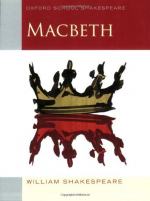|
This section contains 10,673 words (approx. 36 pages at 300 words per page) |

|
SOURCE: Lemon, Rebecca. “Scaffolds of Treason in Macbeth.” Theatre Journal 54, no. 1 (March 2002): 25-43.
In the following essay, Lemon discusses the historicism of didactic “scaffold speeches” made by condemned traitors and examines examples of this kind of rhetoric in the language of various characters in Macbeth.
Treason plagues Macbeth from its opening: by the second scene of the play, the first Thane of Cawdor has betrayed King Duncan, and, by the fourth scene, Malcolm confirms Cawdor's execution for treason. Reporting on the event, Malcolm declares of Cawdor that “very frankly he confess'd his treasons, / Implor'd your Highness' pardon, and set forth / A deep repentance” (1.4.5-7).1 These lines reveal the dying last words of a traitor, familiar to its Jacobean audience as a monologue spoken from the scaffold by hundreds of prisoners.2 Such speeches were characterized by a confession of guilt and a prayer to the monarch as illustrated by...
|
This section contains 10,673 words (approx. 36 pages at 300 words per page) |

|


